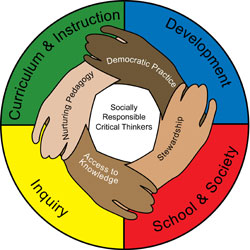 Licensed teachers who have demonstrated years of excellence in classroom instruction often enroll in Master’s in Educational Leadership degree programs in preparation for higher level school administrative positions. This degree helps aspiring principals, vice principals and assistant principals develop the leadership and technical skills needed to guide their schools in effective curriculum development and execution, sound fiscal practices and improved relationships among all stakeholders including parents, students and school boards. Talented teachers who are willing to invest their time in graduate level educational leadership programs become well prepared to sit for their state’s principal certification exam. Although principal certification requirements differ by state, here are some of the topics commonly covered in the degree programs, the various types of degree delivery formats and additional career options for graduates with educational leadership skills.
Licensed teachers who have demonstrated years of excellence in classroom instruction often enroll in Master’s in Educational Leadership degree programs in preparation for higher level school administrative positions. This degree helps aspiring principals, vice principals and assistant principals develop the leadership and technical skills needed to guide their schools in effective curriculum development and execution, sound fiscal practices and improved relationships among all stakeholders including parents, students and school boards. Talented teachers who are willing to invest their time in graduate level educational leadership programs become well prepared to sit for their state’s principal certification exam. Although principal certification requirements differ by state, here are some of the topics commonly covered in the degree programs, the various types of degree delivery formats and additional career options for graduates with educational leadership skills.
Educational Leadership Program Contents
Teachers who move into school administrative positions encounter challenges concerning school policies, personnel issues and public relations just to name a few. As a result, educational leadership course contents often include topics on governance and regulatory rules upon which school policies should be based. Most programs also include courses that demonstrate how to set performance objectives with teachers and measure their outcomes. Innovation is at the heart of the educational leadership curriculum. The program encourages aspiring principals to prepare outside the box in plans for their schools to gain expected results. The educational leadership curriculum also teaches school principal candidates how to effectively measure the success of their initiatives. In the role of principal, education professionals must also interface with stakeholders and manage their expectations. Principals must know how to manage the daily operations of their schools, oversee faculty and staff and facilitate an effective and innovative learning environment, according to the Bureau of Labor Statistics.
Related Resource: Master’s in Educational Leadership Careers
Flexible Degree Program Formats
Educational leadership programs are usually two-year, competency based degree options that can be taken in an online, traditional or hybrid format. Many graduate degree in Educational Leadership programs take full advantage of the advances in technology that allow program curriculum to be delivered in an online format. The advantage to this type of curriculum delivery is the fact that teachers may pursue their academic goals while remaining fully engaged in their teaching positions. In fact, these teachers are in a great position to immediately apply the special techniques and methods learned in the educational leadership course work to their classrooms. Some benefits of educational leadership courses taught in traditional classroom settings are easier access to experienced faculty and many programs include faculty guided internship opportunities.
Optional Careers
Although the Master’s in Educational Leadership degree program is specifically geared towards developing future elementary, middle and high school principals, the program teaches skills that are useful in different job functions. For example, a classroom instructor may enter the degree program to become a school counselor. Others may have aspirations that lead them to positions at the university level. College dean of students, head of academic affairs and other college administrative positions benefit from many of the skills learned in the graduate degree program in educational leadership.
Conclusion
Seasoned teachers have likely already honed their leadership skills through many years of classroom instruction. However, earning a Master’s in Educational Leadership gives them the confidence and skills necessary to successfully gain their principal certifications and lead their schools to academic excellence.
Be the first to comment